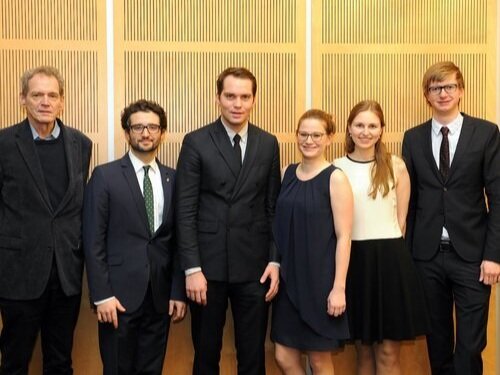Obermayer German Jewish History Award
Christiane Walesh-Schneller
Breisach am Rhein, Baden-Württemberg
There is a house in Breisach, Baden, that until 1940 was the center of Jewish life in the town. Slated for demolition only a few years ago, today the Blaue Haus is a place for research, education and culture—and it has become the nucleus for a new generation of German Jews. “We want to revive history again,” explains Christiane Walesch-Schneller, the leader of the group behind the building’s preservation, “not just on our own, but together with Jewish individuals who have roots in Breisach, as well as those interested in the project.”
With the help of others, Walesch-Schneller, a 53-year-old psychoanalyst and Hanover native, founded the Förderverein Ehemaliges Jüdisches Gemeindehaus Breisach (Society for the Promotion of the Former Jewish Community Center in Breisach) to preserve the historic building and undertake related projects. The förderverein researches local German-Jewish history, organizes visits for Jews originally from Breisach and elsewhere, and offers symposia, exhibitions, lectures and musical programs. And three Jewish families new to Breisach have already held several Shabbat services at the center. “It is an attempt to establish active, ongoing relations again,” Walesch-Schneller explains. For her, the association’s most important task is to involve as many individuals as possible in dialogue, rather than being an institution where that work can be delegated. “She doesn’t settle for the mayor coming with a wreath on the 9th of November [the anniversary of Kristallnacht], she doesn’t rest until the town grasps Jewish history as part of its own,” says Günter Boll, a member of the förderverein and a former German-Jewish History Award recipient.
It took time for Walesch-Schneller to become active. She heard nothing about the Nazi era in school, and her family never talked about it. But interactions with an acquaintance, a daughter of a Holocaust survivor, left her uneasy and questioning. She remained in restless silence until she met Josef Kornweitz in 1998. Kornweitz, a psychotherapist who worked with several descendants of Holocaust victims, inspired Walesch-Schneller in the Breisach association. “He helped me overcome my reluctance,” she says. After that, approaching the past became a matter of “how,” not “whether.”
Then in June 1999, Ralph Eisemann, a former Jewish resident, revealed to her that the Blaue Haus—which the owner wanted to tear down—was the one-time Jewish Community Center. As if to make up for time lost in reluctance, action took over in an outburst of energy. “I asked the owner whether he could wait for half a year,” Walesch-Schneller remembers. Within those six months, she contacted supporters, organized a training program, raised funds and planned an event each week—the whole time not knowing whether there would be enough support or financial means. Initially, eight Breisach citizens agreed to found a society to preserve the Blaue Haus; by November 1999, they had grown to 40. The förderverein achieved its first goal in July 2000 and bought the house. The restoration was completed in 2003, and 240 society members maintain it today.
But facing history and reestablishing relations produces conflicts. In 2000, Walesch-Schneller discovered that a high-ranking SS officer from Auschwitz had gotten an honorary grave in the region and that the state was still paying for it. She researched the story and made it public. Boll says she promotes worthwhile causes even if it upsets officials.
Despite these difficulties, Walesch-Schneller’s outreach has led to more than just contact with descendents of former Jewish residents. Her work “has renewed a sense of belonging and harmony among us, the former members and their descendants of the Jewish community of Breisach,” says Carl Steeg, whose mother lived there. For Elaine Wolff, Steeg’s cousin, the benefit is more intimate. “Breisach has come to mean so much to me now,” she says, “not just because of the richness it brought to my mother’s early life but also because of the connections I’ve made to my mother’s friends, to my newfound family, to the ever-growing group of people who have joined Christiane in this work.”
THIS WALL BRINGS PEOPLE TOGETHER
Students at this Berlin elementary school, built on the site of a synagogue, have been building a wall for the past two decades. It delivers a powerful message about community.
STUDENTS REACHING STUDENTS
When a handful of ninth graders from Berlin met Rolf Joseph in 2003, they were inspired by his harrowing tales of surviving the Holocaust. So inspired that they wrote a popular book about his life. Today the Joseph Group helps students educate each other on Jewish history.
“I SPEAK FOR THOSE WHO CANNOT SPEAK”
Margot Friedländer’s autobiography details her struggles as a Jew hiding in Berlin during World War II. Now 96, she speaks powerfully about the events that shaped her life and their relevance today.



